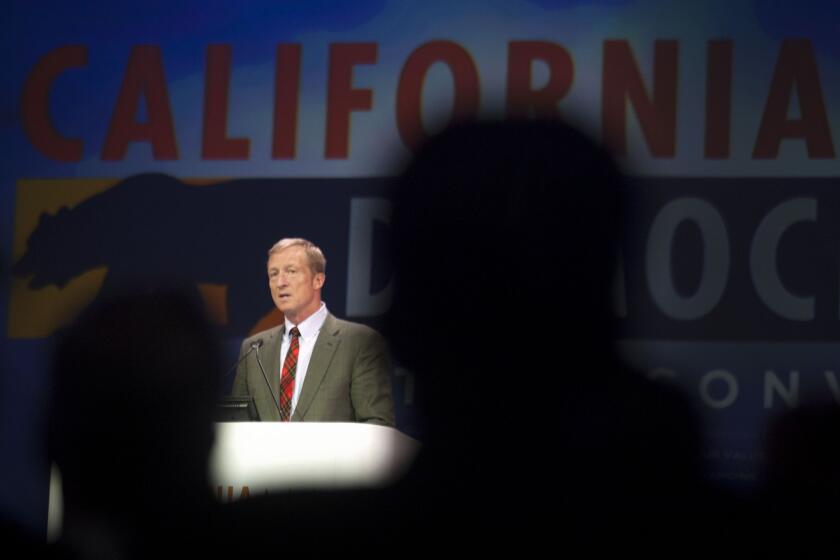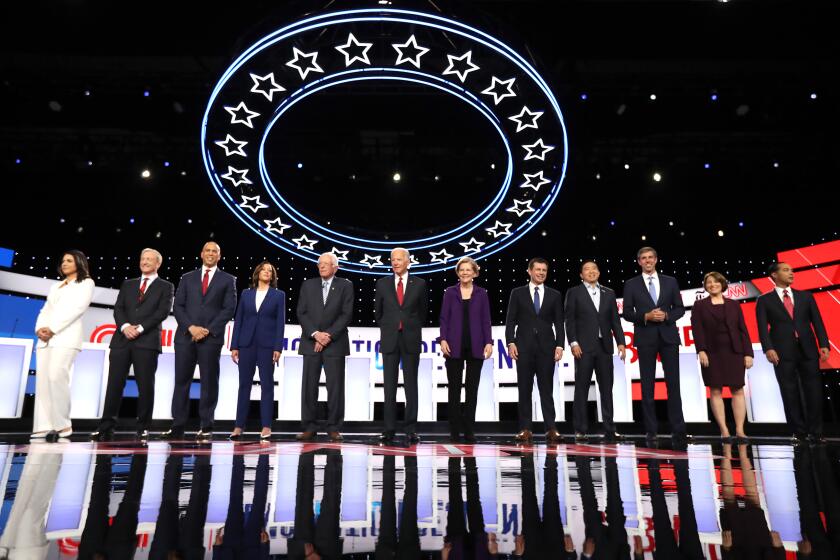Billionaires are the target in this year’s Democratic campaign
- Share via
WASHINGTON — When investment mogul Henry Kravis put his Colorado ranch on the market earlier this year for $46 million, attention to its big-game hunting grounds, marble-countered butler’s pantry and golf course designed by Greg Norman ran high on the society pages — and on the Twitter feed of Sen. Elizabeth Warren.
“Billionaires like this guy make me wonder what our country needs more of,” the Massachusetts senator wrote, “ranches with golf courses designed by PGA players & fireplaces ‘imported from European castles’ — or universal childcare & a Green New Deal?”
It wasn’t long ago that demonizing the super-rich was risky politics for Democrats. Candidates worried about charges of class warfare and feared turning off voters who dreamed of joining the ranks of the 1%. Democratic Party’s economic policies sought to aid the poor and the middle class, but mostly not at the expense of the rich.
As Tuesday night’s Democratic presidential debate made clear, such reticence has vanished from the current campaign.
A widening economic divide, a raft of misdeeds by the billionaire class and diminished political clout for campaign mega-donors have turned the richest Americans into a particularly ripe target this election cycle. Not since the Great Depression have so many candidates so aggressively pilloried the well-to-do.
California billionaire Tom Steyer spent $47 million during the first three months of his Democratic presidential bid. The sum places him on track to join the biggest self-funding political candidates in U.S. history.
“We haven’t seen anything like this since 1936,” said former Labor Secretary Robert Reich, whose films and writings have been a rallying point for rage against the ultra-rich. “That was when FDR said, ‘I welcome their hatred,’” Reich said, referring to President Franklin D. Roosevelt. Now Bernie Sanders has been recycling that exact line on the campaign trail.
“Billionaires should not exist” is emblazoned on bumper stickers sent to Sanders enthusiasts.
The Vermonter isn’t new to crusades against billionaires. But now he has lots of company: California Sen. Kamala Harris boasts that a career highlight was unloading on Jamie Dimon, the billionaire chairman and chief executive of JP Morgan Chase, when she was the state attorney general. Tom Steyer, the former hedge-fund investor, doesn’t let his own billionaire status interfere with bashing the upper crust while campaigning.
“No one on this stage wants to protect billionaires,” Sen. Amy Klobuchar of Minnesota said during Tuesday’s debate. “Not even the billionaire wants to protect billionaires,” she added, referring to Steyer.
Even former Vice President Joe Biden stepped in to burnish his anti-billionaire cred. “No one is supporting billionaires,” he said.
But while others have joined the pile-on against the super-wealthy, it is Sanders and Warren who on many days seem to be in an arms race of billionaire antagonism.
They eagerly bait, troll and bash billionaires at every opportunity. They send out missives to donors boasting how much damage their plans would inflict on the wallets of specific wealthy families and corporations.
Warren promotes her wealth tax by taking aim at the $4 million per hour that Walmart heirs accumulate. She takes pride in the forecast by hedge fund billionaire Leon Cooperman that a Warren presidency would send the stock market into a plunge, reposting his warning on social media to amplify her argument that the rich and powerful feel most threatened by her.
Millions have watched a video explainer by Warren and Rep. Alexandria Ocasio-Cortez (D-N.Y.) outlining how billionaire Eddie Lampert and U.S. Treasury Secretary Steven T. Mnuchin, a mega-millionaire, allegedly enriched themselves while driving Sears stores into bankruptcy.
Sanders boasts that his wealth tax would cost Amazon owner Jeff Bezos $8.9 billion per year. He even championed a bill with the acronym BEZOS: The Stop Bad Employers By Zeroing Out Subsidies Act would have forced Amazon and other large firms to pay the full cost of food stamps and other benefits received by their lowest-wage employees.
The broadsides come amid a raft of new data that underscore why billionaires are such a ripe target. America’s 400 richest families last year, for the first time, paid a lower effective tax rate than the bottom 50% of American earners, a new book by UC Berkeley economists Emmanuel Saez and Gabriel Zucman reported. (In the 1960s and 1970s, the richest Americans typically paid taxes twice as high as those paid by the working class.)
The top one percent of earners in America have seen their wealth triple in the last 30 years, as the bottom half of American earners watched theirs stagnate. Then there are the scandals: Pharmaceutical execs gouging customers, tech execs haplessly failing to protect users’ privacy or respond to foreign disinformation, financial execs bailed out following the mortgage crisis they helped cause.
That has all lead to a souring of American attitudes toward the ultra-rich. A recent survey by the nonpartisan Democracy Fund Voter Study Group found that Democrats overwhelmingly believe the wealthy have too much political influence (89%), exploit people who work for them (78%) and give unfair advantages to family and friends (84%).
Some in the party have been itching for years to crusade against billionaires, but it became complicated in the Obama era.
“President Obama, in some ways, did not allow this,” said Stan Greenberg, a Democratic pollster. “He was trying to make the case for the way he addressed the economic crisis, which was bailing out banks. That created a lot of disgruntlement among the working class.”
At the Democratic debate in Ohio, candidates find common ground in denouncing President Trump, but strike a fractious tone on other issues.
But after Sanders nearly derailed Hillary Clinton in the 2016 primary with his anti-billionaire theme — and Donald Trump won the general election partly by feeding into populist economic resentment — the argument for a measured approach faded.
“This is not just about people being angry because rich people are rich, and they are not,” said Nell Abernathy, vice president of policy and strategy at the Roosevelt Institute, a progressive nonprofit. “The candidates are focused on people who are getting rich at the expense of average Americans.”
As they build their case, there are few things some campaigns prize more than anti-endorsements of the super-rich. Sanders has a full page of them proudly displayed on his website.
He boasts how former Goldman Sachs Chief Executive Lloyd Blankfein warned the Sanders candidacy “has the potential to be a dangerous moment” and how former Verizon Chief Executive Lowell McAdam called the senator’s views “contemptible.” And there is Home Depot co-founder Kenneth Langone recalling the thought that occurred to him when he saw the excitement Sanders created among young voters in 2016: “This is the antichrist!”
Warren, too, has a surfeit of anti-endorsements to brag about. She got major mileage out of the leaked transcript of Mark Zuckerberg, the Facebook chief executive, telling employees over the summer that the firm would pull out all the stops to block her plan to break up Big Tech. The audio stars in a new video produced by the campaign in which various rich and powerful men fret about the economic doom a Warren White House would trigger.
Spliced into the video is billionaire investor Peter Thiel declaring he is “most scared by Elizabeth Warren.”
But all of that does not go far enough for Sanders.
“There are differences between Elizabeth and myself,” Sanders recently said on ABC. “Elizabeth… has said that she is a capitalist through her bones. I’m not.” Warren stops short of echoing the Sanders credo that billionaires should not exist. She instead says they simply need to give a lot more back to the rest of us.
Not every billionaire disagrees. Eighteen of the wealthiest Americans, including Abigail Disney and George Soros, wrote a letter encouraging presidential candidates to embrace the type of wealth taxes Sanders and Warren advocate.
But many are not on board with that idea at all. Unfortunately for them, the persuasive powers that wealthy donors had over candidates are not what they used to be as their campaign contributions have become politically toxic.
Warren and Sanders won’t go near any of their private fundraisers or shadowy campaign committees, raising the resources they need instead through small donors online.
Former Vice President Joe Biden was at one high-dollar fundraiser in Chicago earlier this year when billionaire host Neil Bluhm told assembled donors that Sanders and Warren “don’t represent the Democratic Party” that he supports.
The candidates were happy to help him spread that word.
More to Read
Get the L.A. Times Politics newsletter
Deeply reported insights into legislation, politics and policy from Sacramento, Washington and beyond. In your inbox three times per week.
You may occasionally receive promotional content from the Los Angeles Times.













